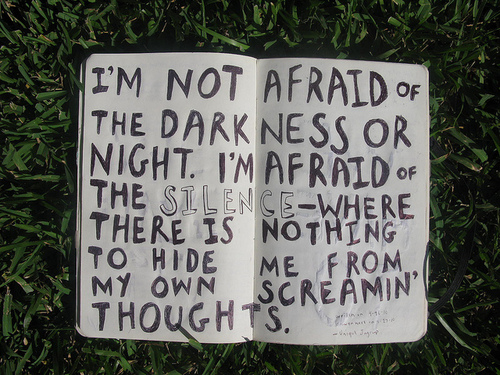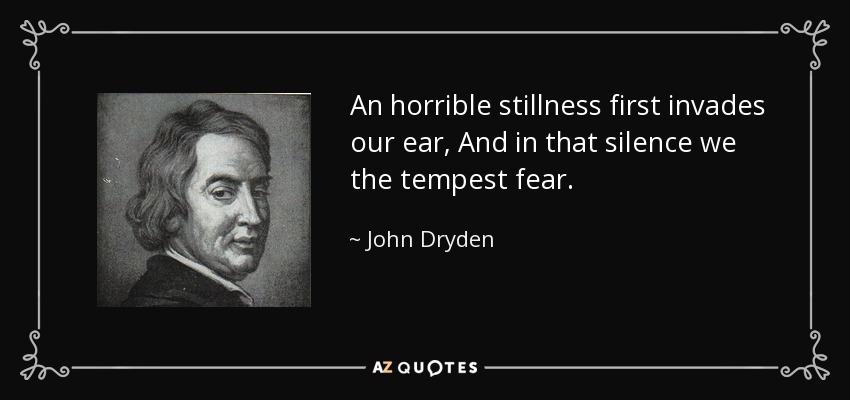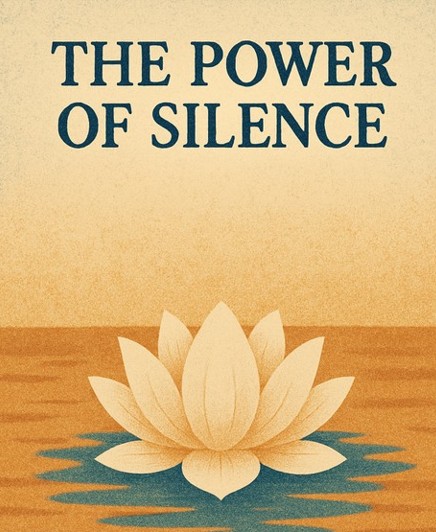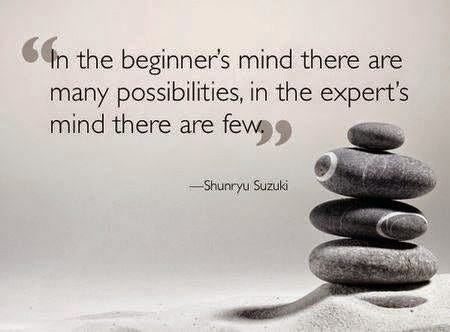The Power Of Silence
A Delayed Response Is A Better Response
Practise the "Beneficial Neurological Delay" for optimal comprehension

Every article I have read on the power of silence assumes that this power is positive. But as an introductory observation I want to offer a contra-view and acknowledge that silence has a dark side, for example:
- In situations of abuse where victims are shamed into a terrified silence and are fearful of the consequences of speaking out.
- Where there is a lack of freedom of speech and people do not express their true feelings and beliefs because they are frightened to speak out for fear of retribution.
- In the criminal world where the "honour code of omerta" rules and people say silent and will not inform the authorities of what they know or have witnessed.
- In the shape of a passive-aggressive silence often used to express dissatisfaction or to punish someone for their actions.
- When someone intentionally withholds information, communications, or feedback as a way of expressing their disapproval.
- In the form of herd mentality and peer pressure when the negative power of silence in groupthink can lead to a decline in decision-making quality, a failure to identify potential problems, and a lack of creativity and innovation.
- It allows space for intrusive negative thoughts that can lead to sedatephobia [an extreme fear of silence].
These are just a few examples of the dark side of the power of silence and they are an example of the duality and polarity of the universe in which we live.
Batting for the forces of "the light side" of the power of silence is Lao Tzu with his popular, often quoted [but unsourced] aphorism: “Silence is a source of great strength.”
What matters is the intent and impact of silence. Is it being used to harm or suppress, or is it being used to nurture, heal, and grow?
How do we define silence? For our purposes in this article I take the view that:
The word silence is often used interchangeably with stillness but they are distinct.
Silence primarily refers to the absence of sound, while stillness is a quality of silence that encompasses both the absence of sound and an inner state of calm and quiet.
Silence is about what is going on around you.
Stillness is about acknowledging both the outer and inner noise, but not being consumed by any of it.
So I feel that we can expand our focus and say that in this article:
The Benefits Of Silence
There are many benefits of silence, in summary it:
- Increases concentration - A silent environment helps to maximize concentration.
- Inspires creativity - People are more creative when they enjoy freedom from interruption.
- Heightens self-awareness - Silence helps you become aware of what is going on in your body, activates the area of the brain that integrates the conscious and subconscious, and digests new concepts and new insights.
- Improves learning and productivity - Two hours of silence per day leads to the creation of new brain cells [neurogenesis] that are linked to learning, memory, and emotion regulation.
- De-stresses and provides a sense of calm - Two minutes of silence can relieve body tension, relax the mind, improve mood states and help focus on the present moment.
- Improves relationships - Silence between people can provide space for receptivity, listening, hearing, discernment, and intimacy.
- Has a direct and positive impact on the body - Silence lowers blood pressure, prevents plaque from forming in arteries, boosts the immune system, and promotes hormone regulation.
Resources:
Dr Jonathan H. Westover, Chief Academic & Learning Officer of HCI Academy has prepared this short, excellent and well referenced review of the benefits of silence:
The Power of Silence: How Taking Pauses Can Enhance Communication, Creativity and Productivity
For a deep dive into a summary of the science behind the benefits of silence:
Neurological Effects of Silence: A Review of Research Studies
Despite its heavy title, this article is a very easy read and offers a thorough and interesting summary of the benefits of silence:
The Neuroscience and Psychology of Silence: Benefits, Practices, and Applications
For many people silence is unsettling and, for some, silence can be scary. There is a term for this: "Sedatephobia". The word originates from Greek ‘Sedate’ meaning ‘silent or sleeping or dead’ and 'Phobos' referring to the Greek God of fear, or dread or aversion. The phobia was
relatively unheard of 50 years ago. However, today, it is a fairly
common experience in one form or another.. However, we do need to keep this in perspective and take a balanced approach. Sedatephobia covers a wide spectrum of reponses to silence ranging from mild discomfort to severe distress and avoidance behaviours. Mild
sedatephobia might involve a general preference for noise or the need
for constant stimulation, while severe cases can lead to significant
anxiety and even panic when faced with quiet environments. Causes Of Sedatephobia
For the vast majority of people, your fear of silence is a learned behaviour. You were raised in an environment of noise such as the TV
playing, the radio on, or even growing up in a household full of noisy siblings. All of this over many years can
make sound feel natural to you, and the lack of it very unnatural. You can unlearn your fear of silence. For the few people who suffer severe reactions of anxiety and panic this is most likely caused by a traumatic event[s] experienced in childhood. You have an association [often unconscious] with something
bad that happened to you when it was quiet and silent or, silence gives you too much time to think about early trauma-filled past
events. You will most likely need professional help to deal with the underlying associated trauma. Common Examples Of Our Fear Of Silence Non Communication We are hard wired for connection and
acceptance; we are social animals. If someone doesn’t
respond to a digital message, or any form of human communication, as quickly as we think they should, their silence can very easily feel like rejection. Back on the Savannah plains in our paleolithic past, rejection from our social group meant
existential risk. In present times, our reaction to a perceived exclusion is hardwired and hits us hard. Thar primal instinct is still there. Conversational Gaps
Fluent conversations are associated with feelings of belonging, self-esteem, and social validation. If even a brief silence disrupts this flow, negative emotions and feelings of ostracism can bubble up. Human beings generally don’t embrace uncertainty well and in the quiet space between spoken words lurks uncertainty.
We can’t control what we don’t know, and this puts us into an unsafe
and insecure state of limbo, with fearful anticipation and anxiety about what might be said or how
others will respond. Digital Distraction A study by lecturer Bruce Fell suggested that digital technology and social media
are exacerbating not only people’s intolerance for silence but also
their dread of it, in some cases so much so that it results in panic
attacks or significant anxiety. He observes that: "By and large my students report they can’t function in silence. As one
explained, 'I actually began doing this assignment in the library and
had to return to my room minutes later to get my iPod as I found the
library was so quiet that I couldn’t concentrate properly!'" Fell continues: "Beginning at infancy, the constant media soundscape has provided the
background noise either side of bassinet, kindergarten, school and
university. It is little wonder many of my students feel agitated and
ill-at-ease when there is not at least one portal providing background
noise." Such background noise speaks to author and activist Bill McKibben’s observations: “TV was like a third parent- a source of ideas and information and
impressions. and not such a bad parent- always with time to spare,
always eager to please, often funny.” Intrusive Thoughts Silence can be ominous - especially when we are alone - and we can’t escape the thought stream throwing
up our fears and
insecurities and aspects of ourselves and our life circumstances that
noise drowns out. This can be really hard in the dark in the early hours
of the morning.
You are not your thoughts, at least that's what your rational mind
tells you most of the time, but that's not how it feels at 3
am when you have woken up and can’t get back to sleep.
You lie in
bed tossing and turning and as your brain wakes up that little voice in
your head that starts nagging you with doubts and fears about money… and your
business failing… about being unemployed (again)… about being
unemployable… you try and ignore it but you can’t. You try and
ignore it, but it keeps on vibrating, and in a milli-second your mind
is flooded with thoughts: “What if there’s been an accident…
Oh no it’s probably from work to tell me a client project has got
delayed, and you need this project because you are self-employed…Oh dear
god, I hope my (elderly) mother hasn’t had another fall and hurt
herself again…” On the drive back there is a news item on the
radio rattling out statistics about Trump's latest trade tariffs for your country and suddenly you are overwhelmed with
feelings of anxiety and fear…and your brain is flooded with thoughts of
financial disaster. If this sounds personal, it is! I suffer from these thoughts in the early hours forgetting
that I am not my thoughts.
Talking About Semantics The
power of silence is experienced in your use of language, specifically: We are talking about semantics. Semantics
studies the meaning of words and is a part of
linguistics. There is a specialisation within this field of enquiry known as general semantics which is the study of the total mind-body neurology included in human language. Alfred Korzybski founded general semantics and in 1933
it was brought into the public domain by the
publication of his book, "Science and Sanity: An Introduction to
Non-Aristotelian Systems and General Semantics". Korzybski observed that human language is
far less efficient than the language of mathematics. Why? Because human
language is deeply subjective and selective. It includes past senses, experiences, intonations and personal evaluations all referencing your own personal library of inner maps of reality. Human
language is 100% neuro-semantic, that is to say it's all about the
models [or maps] you create to apply meaning to your experiences. This
process is intimately and very personally defined by your nervous system
as a response to what you become consciously aware of. But [and this is a very big but] human language is a long, long way away from the source experience. The cognitive process of selection, generalisation, simplification and compression to create the
concepts we employ, the categorizations we apply and the words we
choose and use to articulate a direct experience puts you in a double
bind, and put simply it is this:
Sedatephobia - The Fear Of Silence

Later that day
you are outside in the countryside, enjoying a walk in a forest, and
feeling relaxed. You feel your phone vibrate in your pocket. 
Applying The Power Of Silence

Abstraction
The word that best describes the cognitive process I described above is abstraction.
The simplest way of describing abstraction is to say that it hides complex details and shows only essential features.
Abstracting is a natural process of our body-mind system.
General Semantics teaches us how to be conscious of the several levels of abstraction that we go through with verbalisation being the final one.
These levels of abstraction can be summarised as:
- The source event.
- The psycho-chemical nervous level i.e your body receives an input of the source event.
- Body reaction to the input of the source event.
- Preverbal silence while your body processes this input via your sensory perceptions.
- Labelling - your mind applies a general label to your sensory perceptions - the first stage of verbalisation.
- Articulating the experience - this is the final stage of verbalisation and comprises the full cognitive process of selection, categorisation etc. that we discussed above.
The words that come out of your mouth are a long way away from the raw facts of the source event. Your words are NOT the same as the actual event.
The Beneficial Neurological Delay
The whole purpose of this website is to provide you with practical resources to help you learn how to think, and learn how to stop thinking.
Here's the secret sauce - here is the whole point and purpose of this article:
Here is an important thinking skill to internally “mastermind” your verbal reactions by taking full advantage of the power of silence.
The longer you can
prolong the preverbal silence the more accurate and insightful will be
the words that come out of your mouth when you do eventually speak. Delaying your verbal response will refine and enhance your observational acuity. In practical terms this means being mindful about how and when you speak [internally & externally] after prolonging the preverbal levels of silence. Alfred Korzybski called this a ”beneficial neurological delay”. This is the only way:
Resources:
This article is an easy read and provides an informed overview of this subject. I recommend it to you:
Levels of Silence and Conscious Abstraction: Where Language Meets Mindfulness
Putting This Into Practise
Now we have set the scene and explained what is meant by a beneficial neurological delay let's look at how to put this into practise.
It's one thing to have a beneficial delay by pausing for a few seconds and letting your mind run free wherever your thought stream takes it.
But, to optimise this process it is far more effective to quieten your mind for a few seconds and stop thinking.
Just focus on your breath for 10 to 15 seconds.
The zen way of describing this is to call it mindfulness.
Let's take a look at how to apply this in the following 3 specific situations:
- Listening to the situation.
- Listening to the other person.
- Listening to the quiet inner voice.
Don't be fooled by the simplicity of all this, and don't kid yourself when having read this article and you say to yourself: "That's useful, I got it."
You haven't got it!
As with all mindfulness based practices, you have only "got it" when you have experienced it and are doing it regularly.
These are powerful practices that can transform how you think and respond to situations.
They will show you things you would not otherwise be aware of, they will get you far closer to the truth of the situation and help you to become far more resourceful and effective.
This is the power of silence.
[1] Listening To The Situation

There are 2 important and inter-related qualities that are required to listen mindfully to a new situation or event.
1. Egoless mind - a state of mind beyond thinking. This is the normal condition of your consciousness when you are practicing mindfulness. The most basic mindfulness practice is to just sit in a comfortable position and focus on your breathing and then observe and be aware of your thoughts and emotions without engaging with them.
2. Beginners mind - in the beginner's mind there is no thought, 'I have attained something'. When we have no thought of achievement, no thought of self, we are true beginners. The beginner's mind is not a mind devoid of knowledge, expertise and experience but a state of mind that is devoid of ego.
Just focus on your breath for 5-10 seconds. Then do a quick internal scan and see what comes up into your conscious mind as you enter the verbal stage of abstraction.
This is an intuitive process and insights that arise will precede and shape the followup full process of articulating the situation.
[2] Listening To The Other Person

This is about active listening - beyond the spoken words.
Here are some of the aspects of your mindful listening to the other person:
You are not mentally processing what the other person is saying and working out what you are going to say next.
- You listen with full attention in a state of mindfulness - you are creating a space to receive what the other person is saying.
- You are listening to more than the informational content of what they are saying.
- You listen to everything the other person is saying. This includes listening to how they are speaking, their tone, the emotional content, the energy behind what they are saying and their body language.
- You listen with your whole body. As well as using your ears, you use your eyes and your heart or inner body awareness.
- When the other person has finished speaking, you pause before saying anything and then briefly acknowledge what they have said without passing comment or judgment.
- You only respond further if you have an inner sense of something you want to share in response - you do not respond with what you think about what they have said...
This practicie is explained further in The Practise Of Mindful Listening
[3] Listening To Your Inner Voice

Listening to your inner voice is about stepping back from the constant chatter of your mind and allowing a deeper, quieter presence to communicate.
This is not about some woolly, fuzzy, feel-good vibe.
This is about:
- Accessing a consciousness that lies deep within you - far deeper than thought.
- Tuning in to the profound wisdom, creativity and peace that emerges in periods of inner stillness.
This consciousness:
- Expresses itself when you are fully present.
- Frees you from the suffering we all inflict on ourselves and each other with our delusions and our dogmas.
- Sits behind your thought-stream that has such momentum and that drags you along in its wake, deluding you that every thought matters so much, as it constantly updates your narrative of "my life".
- Transforms how you think and act.
- Is the very essence of who you are.
Learn how to Let Stillness Speak
Return from: "The Power Of Silence" to:
Inner Mastery For Outer Impact or Walking The Talk
Next Article:
Dealing With Setbacks - 5 Questions To Help You Face Discomfort
LATEST ARTICLES
Living in Survival Mode Without Surrendering Mental Authority
Living in Survival Mode Without Surrendering Mental Authority
 Clear Thinking When You’re Just Trying to Stay Afloat. Many people today are overwhelmed because they are living in survival mode - not temporarily, but as a persistent condition of life. For many, th…
Clear Thinking When You’re Just Trying to Stay Afloat. Many people today are overwhelmed because they are living in survival mode - not temporarily, but as a persistent condition of life. For many, th…Manifestation Without Magic: A Practical Model
 Manifestation without magic is not a softer or more intellectual version of popular manifestation culture. It is a different model altogether. Popular manifestation teachings tend to frame reality as…
Manifestation without magic is not a softer or more intellectual version of popular manifestation culture. It is a different model altogether. Popular manifestation teachings tend to frame reality as…Staying Committed When You Can't See Progress - The Psychology of Grit
 Uncertainty Is Not The Absence Of Progress, Only The Absence Of Reassurance. One of the most destabilising experiences in modern life is not failure, but uncertainty and staying committed when you can…
Uncertainty Is Not The Absence Of Progress, Only The Absence Of Reassurance. One of the most destabilising experiences in modern life is not failure, but uncertainty and staying committed when you can…The Battle For Your Mind - How To Win Inner Freedom In A Digital Age Of Distraction
 From External Events to Inner Events. We often think of “events” as things that happen out there: the traffic jam, the rude comment, the delayed email reply. But what truly shapes our experience is wh…
From External Events to Inner Events. We often think of “events” as things that happen out there: the traffic jam, the rude comment, the delayed email reply. But what truly shapes our experience is wh…How to See Your Thoughts Without Becoming the Story
 A Practical Guide to Thought-Awareness. You can spend your life inside the stories of your mind without ever learning how to see your thoughts clearly and objectively. Most of the stuff we tell oursel…
A Practical Guide to Thought-Awareness. You can spend your life inside the stories of your mind without ever learning how to see your thoughts clearly and objectively. Most of the stuff we tell oursel…The Collison Decision Matrix - A Simple Framework for Better Choices
 The Collison Decision Matrix Is A Practical Everyday Thinking Tool. Most of us spend a surprising amount of time worrying about decisions. From small ones such as what to wear, what to eat, what to te…
The Collison Decision Matrix Is A Practical Everyday Thinking Tool. Most of us spend a surprising amount of time worrying about decisions. From small ones such as what to wear, what to eat, what to te…The Power Of Asking The Right Question
 The Power Of Asking The Right Question Lies In The Quest For Insight. To experience the power of asking the right question you must develop the practice of asking questions. The best way to improve th…
The Power Of Asking The Right Question Lies In The Quest For Insight. To experience the power of asking the right question you must develop the practice of asking questions. The best way to improve th…Site Pathways
 Here is a site pathway to help new readers of Zen-Tools navigate the material on this site. Each pathway is based around one of the many key themes covered on this site and contain a 150 word introduc…
Here is a site pathway to help new readers of Zen-Tools navigate the material on this site. Each pathway is based around one of the many key themes covered on this site and contain a 150 word introduc…How To Live With Contradiction - Beyond Thought Let Stillness Speak
 A major impact on so many peoples' lives is the situational contradiction of unfilled realistic expectations. So where does all this leave us? Well here we are, with mental equipment that is more lim…
A major impact on so many peoples' lives is the situational contradiction of unfilled realistic expectations. So where does all this leave us? Well here we are, with mental equipment that is more lim…How To Trust The Process Of Mindfulness - Right Now
 In mindfulness, the process isn’t some distant goal — it's what is happening right now. When we talk about how to trust the process of mindfulness the credibility of the process is heavily dependent…
In mindfulness, the process isn’t some distant goal — it's what is happening right now. When we talk about how to trust the process of mindfulness the credibility of the process is heavily dependent…Inner Mastery For Outer Impact - Mental Clarity For Effective Action
 Insights only matter if they translate into consistent action. In a world crowded with quick fixes and motivational soundbites, the theme “Inner Mastery for Outer Impact” calls us to something more e…
Insights only matter if they translate into consistent action. In a world crowded with quick fixes and motivational soundbites, the theme “Inner Mastery for Outer Impact” calls us to something more e…
